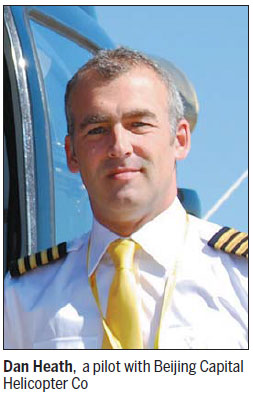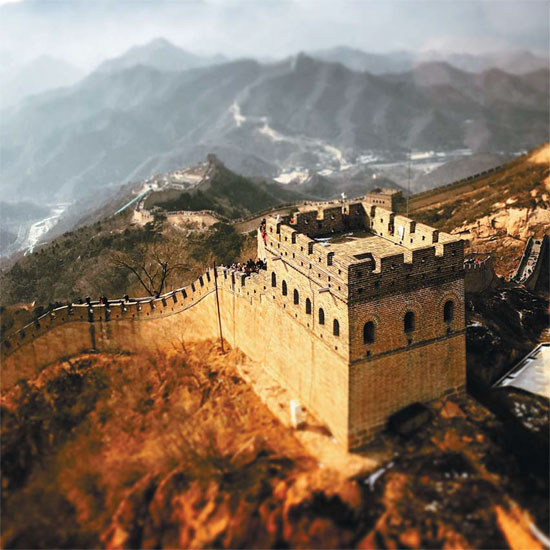It's great, but greater still from up high
Updated: 2015-02-20 08:51
By Wang Chao(China Daily Europe)
|
|||||||||||
Life in paradise gives way to an aerial adventure in China
As front row seats go, the one Dan Heath has nabbed for himself is not bad. In fact you could say it's greater than great. For while hoards from around the world clamber all over the Great Wall of China, Heath flies above them all getting a bird's eye view. That is all the more spectacular on autumn days when the setting sun splashes extra dashes of color onto the maple leaves over the surrounding mountains.
"It's amazing and it's exciting," Heath says. "I never have a boring day."
|
Dan Heath does tourist excursions over the Badaling area of the Great Wall, about 80 kilometers northwest of Beijing. Photos provided to China Daily |
Heath is a pilot with Beijing Capital Helicopter Co, which does tourist excursions over the Badaling area of the Great Wall, about 80 kilometers northwest of Beijing. A 10-minute outing costs 1,000 yuan ($160; 140 euros) per person. Heath also trains people to fly helicopters.
Beijing Capital Helicopter is a subsidiary of HNA Group, which operates helicopters across the country. It owns 10 helicopters and also does charter work. This year, the company says, it will buy another seven helicopters. The company has 34 pilots, half of whom are rated as captains.
Tourism is one part of the company's business, its other activities include providing flights for firefighters and for those inspecting and repairing power lines and other electricity generation equipment.
The company launched an emergency medical service with the Beijing emergency aid center 999 last year, and it has started sightseeing flights of Changbai Mountain, Jilin province, Dalian province, and Panjin in Northeast China.
Before Heath joined Capital Helicopter in 2011, he had been flying helicopters in Hawaii, and he describes this period as "the best years of my life, living in paradise".
He was born in England and grew up in Australia, and his passion for helicopters started when he was a child, when his parents chartered a helicopter as a surprise.
"My father had won some money at the casino in Tasmania, and he treated me and my mother to a helicopter trip in a Bell 206 Jet Ranger II. I sat up front with the pilot, and even to this day I can feel the excitement and thrill of that first flight."
But his career has not all been devoted to flying. For about 13 years until 2004, he says, he worked as an investment banker with Morgan Stanley in Britain and with the French Societe Generale Bank in Spain.
He felt "hollow after years and years of routine work in investment banking", and decided to do more with flying by obtaining Federal Aviation Administration instructor and instrument licenses in the United States.
After living and flying in Hawaii, Heath was looking for something different.

"China is a strong, wealthy country with amazing history, but it has limited experience in general aviation. The allure of combining flight experience and business development was compelling."
Heath contacted a then senior foreign senior captain with Beijing Capital Helicopters, who eventually helped him gain a position in the company. He immediately found out that China was almost a virgin land for helicopter companies compared with Australia and the US.
In Australia, where the population is 24 million, there are more than 2,000 registered helicopters and the number has risen 56 percent over the past six years; in the US where the population is 323 million, the number of helicopters is close to 23,000.
"But in China where the population is 1.4 billion, the number of helicopters was about 500 by the end of last year, including those in Hong Kong and Macao," Heath says.
He created a helicopter tours website for selling tourist flights over the Great Wall (www.greatwallhelicoptertours.com) and in 2013 the company received inquiries on the site that would have given it revenue of $500,000 as a result of bookings, but it lacked aircraft and was able to provide only a fraction of these tourist flights.
"I only created a website and Facebook account. We knew that once aircraft were available we would have a multimillion-dollar tour business."
Heath says some customers are so enthusiastic it is difficult to meet their requirements. Once someone wanted a flight from Beijing to Shanghai, and then to Hong Kong.
"He had no geographical idea of China and I had to tell him it was better for him to use commercial airlines and I would help arrange a helicopter tour in each city."
Few people in China have been on a helicopter, but this is not because of a lack of interest, Heath says.
"I think it's an issue of exposure and availability. There are still limited real operational helicopter companies, and the opportunities for the general public to experience helicopter transport are still scarce. And due to limited knowledge of helicopters, many people still have concerns for safety.
"For example, most people think a helicopter will fall from the sky like a rock in case of engine failure, but this is not true. As long as our rotor blades are turning, we can produce sufficient energy to land. We can land on a dime. This is what makes helicopters such amazing machines."
With his more than 2,100 hours of flying, Heath is one of the BCH pilots responsible for training student pilots in its flight school at Badaling Airport, but lessons are far from cheap. It costs 290,000 yuan to get a private license and 400,000 yuan more for a license allowing the pilot to carry out commercial business.
The Chinese helicopter and general aviation industry is in its infancy, and teaching material in Chinese is scarce. So Heath brought his own library of teaching materials, and colleagues at Beijing Capital Helicopters helped translate it into Chinese.
The job is rewarding, he says. "The best part of my job is to introduce new pilots to the joy and skill of flying helicopters; and I feel happy when I watch customers' faces as we approach the Great Wall from the air. I am happy being a part of the growth of our company at HNA Group and the aviation industry in China."
The company has four models of helicopters: the AS 350-B3, which is nicknamed Squirrel; the EC 135; the R44; and the R22, each with different uses.
For instance, Beijing Capital Helicopter has a long-term partnership with China's State Grid to patrol power lines in the west and south of China, a mission usually carried out using the Squirrel.
Inspecting high-voltage power lines is extremely dangerous and requires fine skills, he says.
"We have to fly very close to the power lines, so the State Grid staff on the helicopter can use their infrared equipment to check whether any conductors need to be replaced."
Such work is a big business worldwide. "The business has amazing potential in China as ultra-high-voltage power lines are being constructed by China's State Grid all over the country."
The helicopter business in China is developing in a way similar to what happened in developed countries decades ago, beginning from flight training, aerial photography and private charters, he says.
In the near future, Heath says, there is great potential in the emergency medical and air rescue sectors.
"China has 1.4 billion people, and the demand could be huge; but there are few helicopters used for this purpose due to regulatory limitations and lack of a sustainable way to charge the clients, as the service can be very expensive."
If China can work out a way to fund emergency medical services, for example through insurance, then many lives could be saved, and this will generate enormous business for helicopter operators, he says.
The Chinese helicopter market is now shared by fewer than 10 companies whose customers are generally in the oil and gas industries.
Heath says he is excited about the future of helicopters and general aviation in China.
"It's an open book, and the helicopter business is about to boom. There is a small but dedicated group of foreigners in China working as pilots, engineers and consultants. The Chinese general aviation market could eventually be the envy of the world. We want to be a part of this growth and development."
wangchao@chinadaily.com.cn
(China Daily European Weekly 02/20/2015 page30)
Today's Top News
Austria on alert following Denmark terror attacks
Rouble's fall to hurt weather forecast: Meteorological center
S Korea top choice for Chinese holidaymakers
UN Security Council slams IS murders of 21 Egyptians
Danish police kill gunman suspected of shootings
Michele Ferrero, maker of Nutella, dies on Valentine's Day
Italy closes Libyan embassy
8th Europe-Ukraine Forum held
Hot Topics
Lunar probe , China growth forecasts, Emission rules get tougher, China seen through 'colored lens', International board,
Editor's Picks

|

|

|

|

|

|






